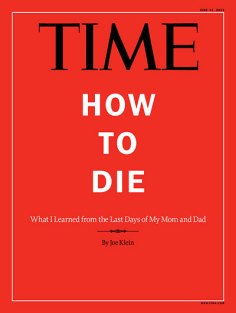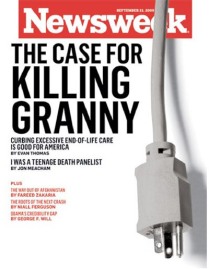Time Magazine promotes Death Care Agenda
June 7, 2012
By LUIS MIRANDA | THE REAL AGENDA | JUNE 7, 2012
The new ‘pull the plug’ care system is now being celebrated by re-known writers and philanthropists as a way to cut down healthcare costs. Not a word about preventive care, though. In an article authored by writer Joe Klein, Time praises the goodness of austere medical care when it comes to keeping the elderly alive, and how doctors together with sons or daughters make the decision about whether a sick, old person should live or not.
The June 11 issue of Time Magazine sells the idea that is should be fine for anyone to decide on someone else’s health or death based on the premise that it will help save resources for others who remain alive, or as Bill Gates said, to hire more teachers. In a video interview, Joe Klein explains how the Geisinger medical system helped him during a time when he was not convinced what to do with his sick parents.
The phone call came on a cloudy morning in Iowa. I was interviewing Senator Chuck Grassley in his farm kitchen, surrounded by a sea of corn. Mom was back in the hospital again. She had pneumonia. She wasn’t eating. “If we don’t put in a feeding tube,” my mother’s internist told me, “she won’t survive on her own.”
Mom had always been vehement about how she wanted to go. “Just pull the plug. Let me die,” she would say, with more than a hint of melodrama. “I don’t want to be a vegetable.” But was she a vegetable now? She had…
See Klein’s video on Time Magazine’s page here. In the video, he sort of blames the traditional medical system for providing services or procedures that he says aren’t necessary, and that doctors usually request because most doctors are paid based on the number of services or procedures they ask patients to take. Klein says that the Geisinger model is better than the traditional one because it saves money as it rations care for patients under the doctor’s guidance and a son or a daughter’s decision not to feed a parent with a tube, but to let him or her die.
One of the biggest cheerleaders of the Geisinger model is US president Barack Obama, whose death panels ran by people who believe that saving a money in the government run healthcare system must come before providing care to an elderly or sick patient. During a September 9, 2009 speech in Congress, Obama spoke about how rationed medicine implemented by the Geisinger system was an example of high quality care at a lower cost. He did not mention, though, that the costs are reduced due to the denial of care, not because the services are somehow cheaper as provided by Geisinger medical centers.
Joe Klein himself admits that the Obama administration wants to change healthcare by moving it in the direction of the Geisinger system. He portrays doctors as bad people because “they do not want to be told what to do,” says Klein. He believes that this opposition stems from the fact that doctors income would be greatly reduced and not because doctors actually know better what services and procedures are needed in order to save the life of a patient, elderly or otherwise. “Fee for service medicine is more profitable for them”, adds Klein. For Mr. Klein just as for Mr. Obama and his advisers, the extra test or monitoring of a patient is often unnecessary even though those tests are the closest thing to preventive medicine. Meanwhile, the establishment of real preventive care is continuously denied by the corporate-controlled healthcare system that refuses to offer it to patients.
In the case of Klein’s father, he says the doctors at Geisinger advised him not to hydrate his dad because even if he did that, he would have to be back in the hospital in a few weeks due to his kidney problems. In his mind, keeping his father properly hydrated to have him around for a longer period of time was not worth the expense that the medical care system would have to endure. According to Klein, the doctors kindly convinced him that it was better to let his dad go. “That level of candor is the kind of thing that most people do not get from fee for service medical doctors,” said Mr. Klein. “That’s what made the death of my parents tolerable,” he concluded.
“For five months, I was my parents’ death panel. And where the costly chaos of Medicare failed, a team of salaried doctors and nurses offered a better way,” reads one of Joe Klein’s revealing comments about his experience. That is what the Obama administration and any other government that advocates for the unsustainable government-controlled socialized medicine model want everyone to have access to. Socialized medicine is not about providing medical care at a lower cost which makes it accessible to most people, but about reducing the costs of medical attention by letting people die when they are no longer profitable. Socialized medicine, for example, does not invest anything more than the current system into preventing disease, which most doctors do not even know how to do. An initiative to fund preventive medicine instead of providing resources to corporate-controlled healthcare systems or government managed Obamacare, would greatly reduce the costs of medical attention without having to choose between keeping a parent alive or hiring a new teacher.
The only thing more successful for big government than establishing death panels composed by bureaucrats who decide whether a person lives or not, is to actually convince people that death panels is the way to go and to turn them into their relatives’ own death panels, as Joe Klein confesses he was in the case of his parents. Under the new medical system that is taking root in the United States, quality care is synonymous with rationed care. To say that the current medical care system is bad because doctors issue requests for services and procedures that may or may not be necessary, but that people can trust other medical professional in hospices because for some reason they are more ethical about providing care, is simply preposterous. On the contrary, in a rationed care system, medical professionals are assured to receive a minimum compensation they are comfortable with, which might facilitate their decision not to provide care to patients if they believe it is not necessary or worthwhile and that it would lower the costs of the most likely government-controlled medical system.
A healthcare system that promotes austerity and rationing for patients is not one that will offer the best care for patients, especially for elderly people, but one that will look for every possible reason not to provide much needed medical attention. Its goal is to cut expenses, not to improve the life of the patient. It is naive to believe that doctors under the Geisinger or any other rationed system will have the interests of the patient at heart when they don’t have any incentive to do so. In fact, their incentive is mostly to cut costs and deny care while making the choice of death look kind and benevolent.
The way to solve the debacle of the medical care system anywhere is to prohibit the medical industry from writing the laws that govern such system, invest in preventive care and not in the perpetuation of the mass drugging of the population, to actually prepare doctors to treat patients as supposed to put them on pharmaceuticals — which by the way kill more people than they help — for the rest of their lives and to educate people about the the thousands of poisonous ingredients being put in the food and water, so that they can choose not to consume them. A good healthcare system is not mutually exclusive. It is possible to have great care without rationing.



